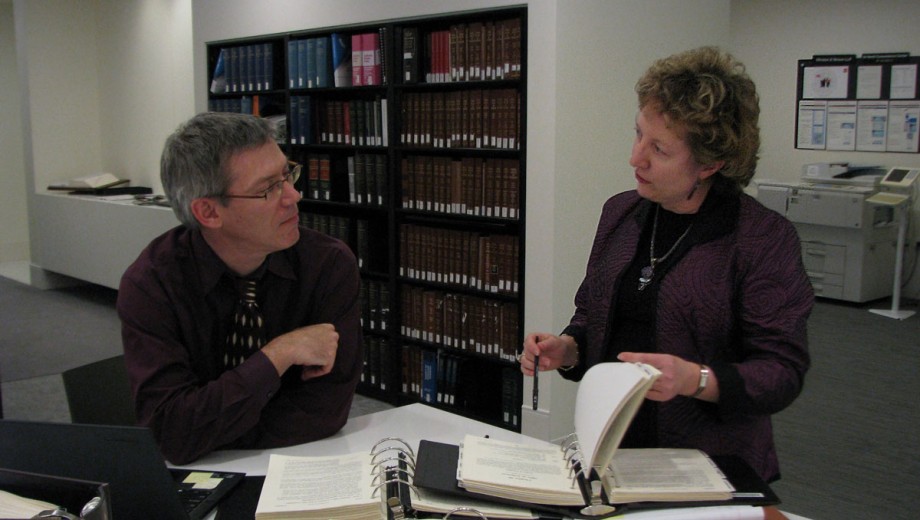The alumni librarians profiled in “Ancient Books and Modern Technology” offer more thoughts on their work and preparation for it.
Early exposure
Matthew Heintzelman, AM’84, PhD’00, curator for the Austria/Germany Study Center at the Hill Museum & Manuscript Library at St. John’s University, worked four different jobs at the Regenstein when he was a student, including serials cataloging assistant and rare books coordinator. “The biggest thing it probably taught me was how libraries work as a system, as an organization, that there are all these different parts,” he says. “If you only work in one part, you miss how the other pieces fit together.”
Marlis Saleh, PhD’95, bibliographer for Middle East studies at the University of Chicago Library, also worked in the Regenstein while earning her library degree at Dominican University in suburban River Forest, Illinois. “The University Library is a very complicated place—we try to help people navigate it in order to make the best use of it,” she says. “I’ve been familiar with the collection for decades now, which is the best possible preparation for helping people exploit it.”
A long way from the card catalog
For Carolyn Lundin, AM’83, senior manager of research services at the law firm Winston & Strawn, LLP, staying up to date on emerging library technology is key.
“There are always new research platforms coming along that we have to learn quickly or whose usefulness we have to assess,” Lundin says. Keeping up with the technology is challenging, as are the demands of a business where someone, somewhere, is always on the clock.
“What we’re seeing is an increased need on the part of the attorneys for 24/7 assistance and coverage,” she says. “It’s not every day, but we do get after-hours emergency requests, sometimes on the weekends.” Still, she enjoys the variety of requests and the different practice areas of other offices—“especially the international offices”—and new research platforms to support them.
Teach someone to fish …
Give scholars a source, they can read for a few hours. Teach them to find a source, they’ll read forever.
Lori Osborne, AM’85, archivist at the Evanston History Center, sees her job as a natural extension of her academic work. In addition to assisting in the research room and scanning records for the electronic database, Osborne helps Evanstonians research the history of their homes, serves as director of the Evanston Women’s History Project, and tries to capture stories that may be of interest to present and future researchers. She partners with groups that create oral histories, podcasts, and publications documenting African American experiences in Chicago and Evanston.
Osborne says that, like all archivists, one of her main tasks is to bring the mind of the researcher to the primary sources, which is why her research training at UChicago was so valuable.
“The order I establish and the guides I write are all done with the future researcher in mind,” she says.
Saleh too enjoys empowering students and faculty to do their own work.
“You eventually can step out of that role of intermediary and allow people to just work directly with what they have. You don’t want to be the funnel where they only get what you give them.”


Add new comment